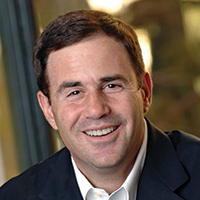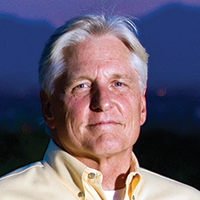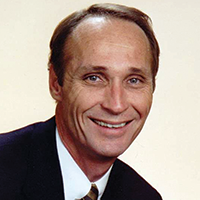On Tuesday, Nov. 4, Arizona voters will elect the next Governor of Arizona. In Business Magazine invited candidates Doug Ducey, Fred DuVal, Barry Hess and J.L. Mealer to share their views and plans for business and economic growth.
 Doug Ducey (Rep.)
Doug Ducey (Rep.)
What are three things you would do in your capacity as governor to spur economic growth and employment, especially in the Greater Phoenix metropolitan area?
If we want to build a healthier economy and greater opportunities for Arizonans, we need to make sure our tax code protects hardworking taxpayers. Arizonans deserve a tax code that is simpler, flatter, fairer and a lot easier. After all, it’s your money — you should get to keep more of it and I’ll work tirelessly to make it so.
It’s not always about creating new policies — sometimes it’s about eliminating overly burdensome regulations that strangle small-business growth. Let me be very clear: I will go through the state’s budget and statute line by line, dollar by dollar, and I will cut the waste, end the special interest and lobbyist loopholes, and stop adding regulatory costs to Arizona employers.
Finally, I want to reform K-12 education in Arizona because our kids deserve an excellent education that creates real opportunities. When it comes to educating our students, there shouldn’t be winners and losers. Our responsibility is to prepare our children with the skills they need for life. It’s not about how much we spend; it’s whether we deliver real results.
Where do you see the economic growth coming from?
Imagine a future where local businesses can expand and where companies outside of Arizona look to us as the perfect place to do business. Politicians talk about new jobs and I believe leaders go get them. That’s the kind of governor I intend to be. It’s time to improve schools, streamline regulations, lower taxes and create a friendly business environment for Arizona businesses to thrive.
How would you have the state agencies responsible for economic growth — notably the Arizona Commerce Authority — work with regional and local entities to further economic growth?
Our objective is simple and clear: a more efficient, effective and accountable government that will deliver Arizona the healthy, growing economy hardworking taxpayers deserve. My step-by-step plan of action will attract and grow businesses, create good-paying jobs and long-term careers, and achieve consistent and measurable growth. I will work with any and all state, regional and local entities to drive results to that end.
What resources or programs do you believe we need to create, revamp or remove to ensure Arizona has the educated and highly skilled work force necessary to support the state’s economic growth plans?
My focus will remain on opportunity — for some, that will mean a four-year degree; for others, it might mean certification in a technical trade. The end result is that our education system would afford opportunities that allow Arizonans to work hard and have a chance to get ahead, in whatever path is best for them. To that end, higher education must be affordable and attainable so that hardworking Arizona families can take advantage of these opportunities.
Doug Ducey was born and raised in Toledo, Ohio, and came to Arizona in 1982 to attend ASU, where he earned a degree in finance. After working at Procter & Gamble, Ducey helped launch Cold Stone Creamery on its path to success. Alarmed by the state of the economy, and the massive spending and debt that government was incurring, Ducey decided to make a positive difference by seeking public office and, in 2010, was elected as Arizona’s 32nd state treasurer.
 Fred DuVal (Dem.)
Fred DuVal (Dem.)
What are three things you would do in your capacity as governor to spur economic growth and employment, especially in the Greater Phoenix metropolitan area?
There is a lot more we can do to attract high-quality, good-paying jobs and spur economic growth. We can create jobs and secure sustainable growth for our communities by giving tax relief to small businesses that hire new employees, connecting our universities and community colleges to local companies so our graduates can find jobs and start careers, and investing in 21st-century industries like solar and renewable energy.
Where do you see the economic growth coming from?
Our economy can grow significantly if we find new markets for Arizona products by expanding our trade with Mexico and attracting new, innovative industries such as solar and renewable energy. In order to expand our trade with Mexico, we’re going to have to stop passing legislation that demonizes Mexican-Americans and doesn’t reflect who we are as Arizonans; and push the federal government to invest in infrastructure, such as ports of entry, the Interstate-11 corridor from Phoenix to Las Vegas, improved rail networks, a new international cargo airport, and major highways that connect Arizona to key markets in Mexico and the western United States.
How would you have the state agencies responsible for economic growth — notably the Arizona Commerce Authority — work with regional and local entities to further economic growth?
There’s no question that the Arizona Commerce Authority is an important leader in this arena, and I believe it will continue to be a leader in increasing competitiveness and attracting new and exciting industries to Arizona. There is still some work to be done to increase transparency, but overall the Arizona Commerce Authority has been a step in the right direction. Additionally, I will call on the director of each state agency to identify the 10 most effective actions that can be taken to contribute to job creation, including the extension of the moratorium on new regulations and a line-by-line review of all existing regulations.
What resources or programs do you believe we need to create, revamp or remove to ensure Arizona has the educated and highly skilled work force necessary to support the state’s economic growth plans?
For years we have made it known that education is not our top priority. That has got to change. When times got tough and the economy took a hit, education bore the brunt of damaging cuts. As governor, I will stop the cuts to our children’s schools — cutting not another dollar, not another dime. My opponent supported those cuts and wants to continue delaying reinvestment in our children’s schools with endless delays and appeals. I want to talk about education in the schoolhouse, but my opponent is dead-set on talking about it in the courthouse.
Fred DuVal is a business and education leader from Phoenix, Arizona. He has held leadership positions in the Arizona Governor’s Office; the White House; Arizona’s public university system; and in the private sector, where he was credited with solving big problems for middle-class families. DuVal graduated from Tucson High School. He received a B.A. from Occidental College and a degree in law from Arizona State University.
 Barry Hess (Libert.)
Barry Hess (Libert.)
What are three things you would do in your capacity as governor to spur economic growth and employment, especially in the Greater Phoenix metropolitan area?
1) Work to immediately eliminate the personal income and property taxes, and put that money into the hands of the people who earn it — to stimulate the economy in areas where the market demands, not some politician picking “winners and losers” for political favor — and replace the revenue with a sole, flat, 9.9-percent retail sales tax (which could result in many times the current revenue from income/property taxes).
2) Go to a sole, flat 4-percent tax on the gross of all businesses without deductions or offsets.
3) Remove excess bureaucratic regulatory hindrances that now stifle growth.
These simple actions would regain confidence in government; force businesses to expand (to keep up with increased customer spending); and “invite” new businesses to start up in or relocate to Arizona, to take advantage of the tax and regulatory stability.
Where do you see the economic growth coming from?
Real economic growth will come from where it always has — the private sector. The greatest hindrance to economic growth has always been government interference in its attempts to regulate or direct markets. Recently, California repealed a law that made it illegal to sell homegrown goods from vending carts, and instantly more than 1,000 new businesses sprang up. Imagine what exciting innovations will spring up when Arizona lifts the ban on the industrial hemp industry. With more than 30,000 manufacturing uses, hemp could well become Arizona’s economic savior and lift us from this worsening economic depression. Inevitably, when we decriminalize marijuana for all purposes, we will also see economic growth, just as we will in turning our attentions to energy production and storage.
How would you have the state agencies responsible for economic growth — notably the Arizona Commerce Authority — work with regional and local entities to further economic growth?
It’s a pleasant fallacy to think that government agency can be “responsible” for or influence economic growth in any positive way. As we continue to see, all these entities do is inhibit the free market, the only true generator of jobs — and the sole basis of economic growth and stability. Government infusions of valueless currency are just temporary and short-lived solutions. We need to re-establish a fundamental economic foundation to provide more jobs than we have labor to fill them. The hard truth is that there is no such thing as a “jobless” recovery. Jobs provide the ongoing ability to sustain economic activity indefinitely. If government commerce authorities were able to influence economic or industrial growth, obviously we wouldn’t have lost the vast bulk of our manufacturing base, and we would not be buried in economic depression.
What resources or programs do you believe we need to create, revamp or remove to ensure Arizona has the educated and highly skilled work force necessary to support the state’s economic growth plans?
Though it may make some squeamish, we need to face the facts that 1) college isn’t good for all students, and 2) government schools have failed Arizona miserably (we’re ranked last, or next to it, of all 50 states). So, we need to curtail the curriculum to the very basics: science, math, reading, history, economics and, most importantly, critical thinking skills. To prepare students to learn whatever they desire. “Education” only begins with a diploma or a degree. We should encourage the private sector to provide additional training that is specific to their chosen employment or vocation, at their own expense.
Libertarian Barry Hess graduated from Fordham University in New York City and moved to Arizona in 1980. Since then, he has been a powerful force in Arizona politics, and has earned the respect of people from across the political spectrum. In 2012, he spearheaded the largest, most diverse coalition in Arizona’s history — the first successful Citizen’s Referendum in more than 30 years. He is an author, and has founded and owned several small businesses.
 J.L. Mealer (Indep.)
J.L. Mealer (Indep.)
What are three things you would do in your capacity as governor to spur economic growth and employment, especially in the Greater Phoenix metropolitan area?
Three? You’ve got to be kidding. The issues that created our “last in line” economic position cannot be cured by three defined “things.” I will be forced to generalize like a politician — which I am not. These programs are all researched, water-wise and implemented simultaneously:
First: Enforce the law on elected officials and globally traded corporations to even the playing field. No more bribes to pass laws that hurt the little guy.
Second: Bring in the Seven Pillars of industry that have been waiting for Arizona to allow them into the state. The following industries are water-wise and ready to go; this is not pipe dreaming:
These seven pillars are turn-key:
I. Omnibus Program (See: Mealer Initiative 2014).
II. Major manufacturing from a variety of Omnibus-created businesses as well as those listed below.
III. Industrial hemp (untouched industry; scope of $3 trillion over five years, including new construction, new farm towns, new related and unrelated businesses, thousands of products, biofuel replacement for corn ethanol and more, plus exports).
IV. Biomedical industry, including cannabinoids (untouched; scope of $2 trillion over five years), easily cornering “non-opiate-based” medication R&D, medication manufacturing. Decriminalize, regulate and tax cannabis sales and private growth.
V. New “Arizona Meat and Agriculture Department” promoting/exporting all exclusive AZMAD-endorsed, high-grade, in-state grown/raised products. This is one program that Arizona must be involved with. Water-wise under the right parameters.
VI. Aerospace/Motorsports. Freebie to the state if we end corrupt politicians pay-to-play.
VII. Entertainment industry ($3 trillion worldwide; Arizona can make $30 billion of this total over five years). We must revive and revamp the State Film Office into the State Entertainment Industry Office.
Third: Prove to new industry that we have a positive, non-corrupted education system that will churn out educated young adults. Plus the end of pay-to-play. Industry and new business do not like Arizona’s current climate of corruption and backroom deals to open shop. Right now, I have connections to a billion-dollar return of the Phoenix Gran Prix slated for February 2015. All the world’s major automakers and many smaller companies will put their investment into this soon-to-be annual race in Phoenix streets. The surrounding area will turn more than a billion dollars in this one race.
Where do you see the economic growth coming from?
This is covered at length in the above answer.
How would you have the state agencies responsible for economic growth — notably the Arizona Commerce Authority — work with regional and local entities to further economic growth?
The agency, such as the Arizona Commerce Authority, would need to be a useful agency in the first place. Without that, they cannot assist in anything with regional and local entities in the furtherance of economic growth.
What resources or programs do you believe we need to create, revamp or remove to ensure Arizona has the educated and highly skilled work force necessary to support the state’s economic growth plans?
Apprenticeship programs will help with new industry, but we must have a state land lease program to ensure room for the new businesses and industries while we pay for K-12 education. I have that program. The Mealer Initiative 2014 offers a detailed plan for Arizona’s own commodity exchange that will create an entirely new tier of an economy and yet another basis for Arizonans to train to work toward. I would like to open a State Bank to help individuals pay interest-free loans for specific educations and even for the 10-year student-to-nowhere programs we see around us. The paid apprenticeship program will help students with in-state school payments.
J.L. Mealer was born and raised in Arizona. He is a mechanical engineer and developer with 25 years’ experience. Mealer opted to run for Governor to revive and reinvigorate Arizona, solving construction industry budget shortfalls and living viability by implementing alternative building materials. His passion is to “engineer a better mousetrap”; his involvement in auto racing influenced Mealer Automobile with multiple patents that include a multi-fuel engine/non-fossil fuel-powered regenerative energy system.
















